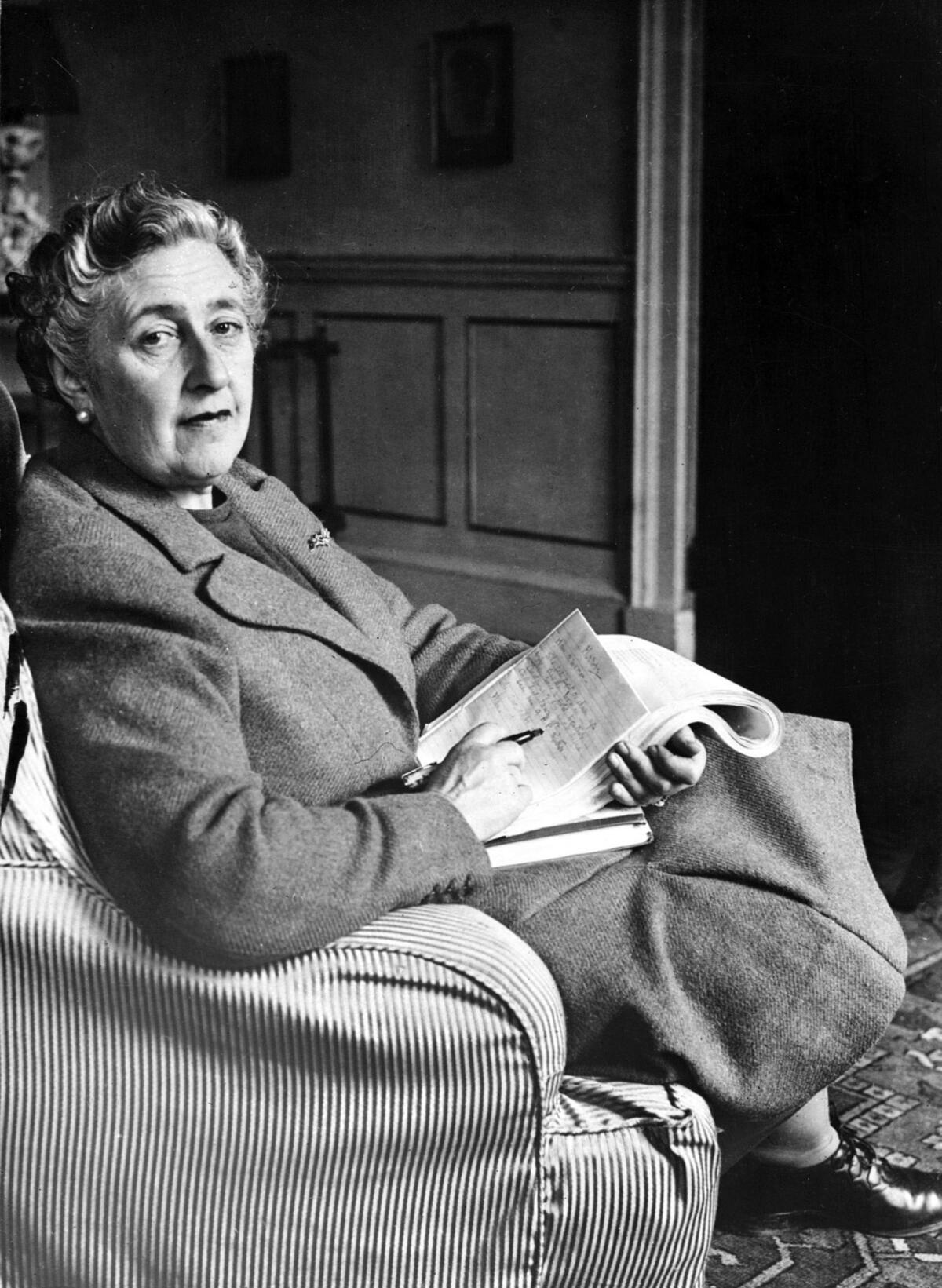Review: Cozy up your holiday reading with homages to Dame Agatha and detective Holmes
On the Shelf
Two Mystery Homages
The Mystery of Mrs. Christie
By Marie Benedict
Sourcebooks: 288 pages, $27
In League with Sherlock Holmes
Edited by Laurie R. King and Leslie S. Klinger
Pegasus: 368 pages, $26
If you buy books linked on our site, The Times may earn a commission from Bookshop.org, whose fees support independent bookstores.
No matter where you live or what you celebrate, the December lull offers an irresistible tableau: you, a beverage of your choice and a good book, curled up by a fire.
Perhaps it’s a hammock or a beach towel, but even without a hearth, there’s something classic about the perfect fireside book — more often than not, a cozy mystery. No gore, just a clean puzzle to solve. Arriving like fine British clockwork at the end of this very uncozy year are two titles that will slake your thirst for clues, red herrings and, most of all, familiarity. That’s because they involve two of the world’s most famous names in sleuthing: Agatha Christie and detective Sherlock Holmes.
Marie Benedict’s “The Mystery of Mrs. Christie” fictionalizes the author’s well-known 11-day disappearance in December 1926. When Christie’s fur coat and valise were found in her car near a deep pool, police and the public feared the worst. Had she been abducted? Done away with herself? Wound up murdered?
If you think you already know everything about the case, rest assured that Benedict (“The Only Woman in the Room,” “Lady Clementine”) plays a long game, both consistent and factually solid — although you may not enjoy it if you’re not already a fan of historical fiction. Her research provides glimpses into upper-middle-class British life in the 1920s that little resemble popular images of the roaring glitterati. Not to say there isn’t a rebellious streak in Agatha Miller, who throws over her staid fiancé, Reggie Lucy, to marry dashing Archibald Christie in 1914.

Still, Benedict’s young Agatha adores her beautiful, rule-bound mother and slavishly abides by her dictum that “A gentleman cannot be left alone for too long.” She attempts to keep a perfect house, be a perfect cook, remain a perfect lover. Even after the Christies have their only child, Rosalind, Agatha vows to Archie that “you will forever be my focus. You and no one else. Not even this baby.”
Karen Powell’s “The River Within” is far more than a “Downton Abbey”-derived Yorkshire mystery; it’s the anatomy of a caste system that’s never gone away.
Tensions rise when Agatha, defying her acerbic sister Madge’s barbs, writes a mystery novel. Having spent the years of World War I — while Archie was on flight duty — working as a nurse, Agatha has gathered enough technical knowledge of poisons to employ them as an untraceable murder weapon, at least in fiction. “The Mysterious Affair at Styles” (Styles was her childhood home) was not a huge moneymaker, but the debut launched Agatha Christie as a new voice in detective fiction. And then, 12 years after her wedding, she vanishes.
“The Mystery of Mrs. Christie” alternates between the 1926 disappearance and the arc of Agatha’s life with Archie to that point. One thing Benedict does very well is to ratchet up the tension of Archie Christie’s suspected involvement; we know he wants a divorce and plans to announce his engagement to his mistress, Nancy Steele. It’s not a whodunit or even a whydunit, but a sort of how-the-hell-did-he-do-it? As Christie’s first and best-known detective, Hercule Poirot, might say: Patience. All will be revealed.
The denouement promises suspense, and a murder, though not necessarily adhering to the rules of fair play for which some mystery aficionados revere Christie herself. The evolution of Archie’s character, as Agatha’s career takes flight and the colonel’s clout plummets, sets up an ending that can’t be born out. You won’t find the answer to this mystery unless you’ve paid close attention to Agatha — not the writer but the character.
In Laurie R. King and Leslie S. Klinger’s new anthology, “In League With Sherlock Holmes,” the 15 contributing authors pay very close attention to Sherlock, the character — each in his or her own way. In the editors’ third collection of Sherlock-inspired stories, it’s the diversity of authors and approaches that stands out.
There’s a horror story by Chelsea Quinn Yarbro, a séance featuring creator Arthur Conan Doyle (a known devotee of spiritualism) by Lisa Morton, a graphic short by Joe Hill and Martin Simmonds and even — from Naomi Hirahara — a 1980s slacker-era murder mystery set at Stanford. They hew to the source lore to varying degrees. Some of the stories feature Holmes and Watson and Conan Doyle. At least two include the phrase “The game’s afoot”; one involves the evil Moriarty; and another eavesdrops on a meeting of the Baker Street Irregulars. Others have none of these elements. There is, though, a Shel Rock, a “S—-Talk,” and a Sherlock in utero.
People have been concerned about Rowling’s feelings about transgender rights for some time. The release of her latest detective novel shows those feelings seeping into her work.
The editors’ familiarity with Holmes cannot be denied or slighted: King’s Mary Russell series involves the aging Sherlock’s young and brilliant wife; Klinger’s bio lists him as “the world’s first consulting Sherlockian,” an expert on offer to publishers, writers and academics. But the whole point of the series was to open up the canon, to invite “persons not previously known to be friends of Holmes” to interpret what it means to be “inspired” by Dr. Watson’s tales for themselves.
Turn not these pages, then, if you’re interested only in Holmes qua Holmes, playing his violin in his dressing gown, injecting cocaine and calling for Mrs. Hudson. One of the best stories, by Kwei Quartey, takes place in Ghana; another excellent entry, by Joe R. Lansdale and his daughter Kasey Lansdale, is a truly creepy supernatural tale set in a Colorado mansion with Holmes and Watson refashioned as a ghost-hunting team named Dana and Jana. Maria Alexander even doffs her hat to that most popular new Sherlock Holmes actor in the thirsty piece “Cumberbachelor.”
Some of the stories work better than others, and in some reviews it would be appropriate to point out which. In this case, it might be better to let readers decide for themselves. One man’s Sherlock is another’s Watson, and one woman’s murderous thrills might be another’s deathly boredom. Just as all of the writers involved have their own takes on Holmes, so will anyone who picks up this book. And anyone fascinated by the interplay of Holmes and Watson — logic and emotion, intuition and science, detection and storytelling, or anything else you see in these everlasting archetypes — definitely should. There are far worse ways to pass a dark and uncommonly solitary holiday season.
During his first trip to Comic-Con in July, Benedict Cumberbatch stopped to chat about his many brainy characters, from the detective he plays on the BBC’s “Sherlock” and the World War II codebreaker Alan Turing, whom he portrays in the upcoming movie “The Imitation Game,” to Hamlet and an animated wolf.
Patrick is a freelance critic who tweets @TheBookMaven.
More to Read
Sign up for our Book Club newsletter
Get the latest news, events and more from the Los Angeles Times Book Club, and help us get L.A. reading and talking.
You may occasionally receive promotional content from the Los Angeles Times.









